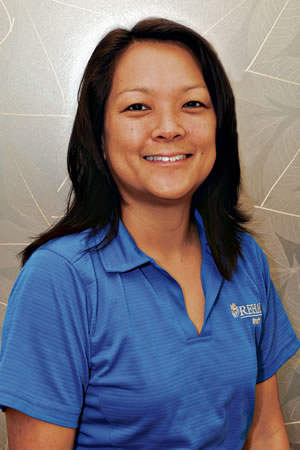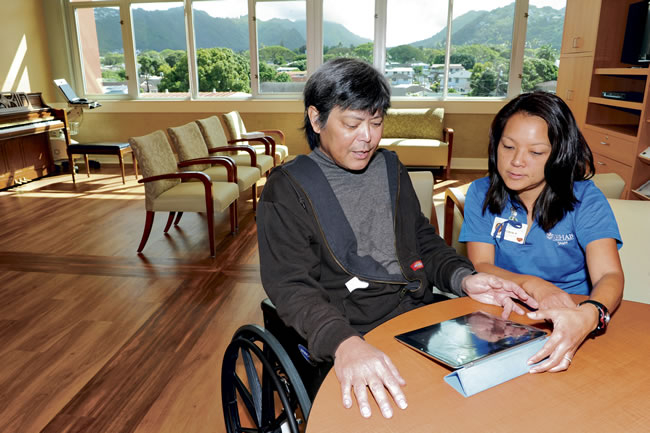Speech And Hearing Month
Robin Palama
Clinical specialist for speech at REHAB
Where did you receive your schooling and training?
I got my Bachelor of Science and my master’s in speech-language pathology and audiology at UHManoa. As part of our academic requirements I had to complete a clinical extern-ship in varied environments, which provided a wonderful learning experience. Before obtaining my license, I had to work for nine months under a licensed speech-language pathologist and pass the board exam.
Robin Palama
How long have you been practicing?
I have been working as a speech-language pathologist for 16 years, all at REHAB Hospital of the Pacific.
You are the clinical specialist for speech, and May is Speech and Hearing Month, yet you wanted to talk about preventing memory loss. How do the two relate?
Many of the patients we work with at REHAB Hospital are stroke or brain-injury survivors. Memory is often impacted from these diagnoses, and the speech-language patholo-gist, along with the rest of the REHAB team, assist the patient in regaining some of their memory function as well as incorporating compensatory strategies or assistive devices. With all the new technology out there, people with memory loss can utilize these devices to help them live in a more safe and independent manner.
When you work with these patients, to what extent are you able to help them regain their memory function?
The range of memory loss can be from minimal, such as forgetting details of a recent event, to severe, such as not remembering their own name or spouse’s name. Oftentimes their memory difficulties are impacted by their inability to attend because of pain, frustration, over-stimulation, etc. As their ability to focus and attend improves, this may also help them recall better. As needed, we also will implement the use of compensatory strategies or assistive devices such as a memory book, planner/calendar or smartphone to help them be more independent upon discharge.
What are some of the main tasks and issues you work with at the hospital?
Our speech team completes comprehensive speech-language, cognitive-communicative and/or swallowing evaluations and treatment to our patients in need. All our patients and caregivers participate in caregiver education and training before discharge, and are encouraged to take an active role in setting their rehab goals. In our speech treatments we incorporate the use of such technology as the iPad2, Dynavision (assists with attention, scanning and vision) and Parrot Software (various exercises on the computer to work on attention, memory, sequencing, reading, writing, numerical reasoning and more), and for our swallowing treatments we offer the VitalStim (neuro-muscular stimulation used to strengthen the swallowing muscles) and DASI (provides visual feedback about your swallowing function) as appropriate. We also complete community assessments with some of our patients to evaluate their communication, cognitive and/or swallowing skills outside of the hospital setting. This helps us individualize their treatment plan and focus our therapy on areas that are impacting their safety and independence in the community.
What are some tips to help prevent memory loss?
As we age, we tend to have more “senior moments,” however, we can all help prevent memory loss, or at least slow it down, by incorporating these simple tasks in our everyday lives:
No. 1: Exercise 30 minutes a day, five times a week. Studies have shown brisk walking for 30 minutes a day or taking part in physically active hobbies such as gardening help lower the risk for Alzheimer’s disease. No. 2: Eat healthy. Eat a variety of fresh fruits and vegetables. No. 3: Get a good night’s sleep. Aim for six to eight hours of good quality sleep a night. No. 4: Socialize. Healthy socialization with loved ones helps you ward off depression and stress. No. 5: Stay mentally active and keep learning – this is what we do with our patients. We have them participate in “thinking” activities and encourage them to continue when they go home. Remember … use it or lose it!







